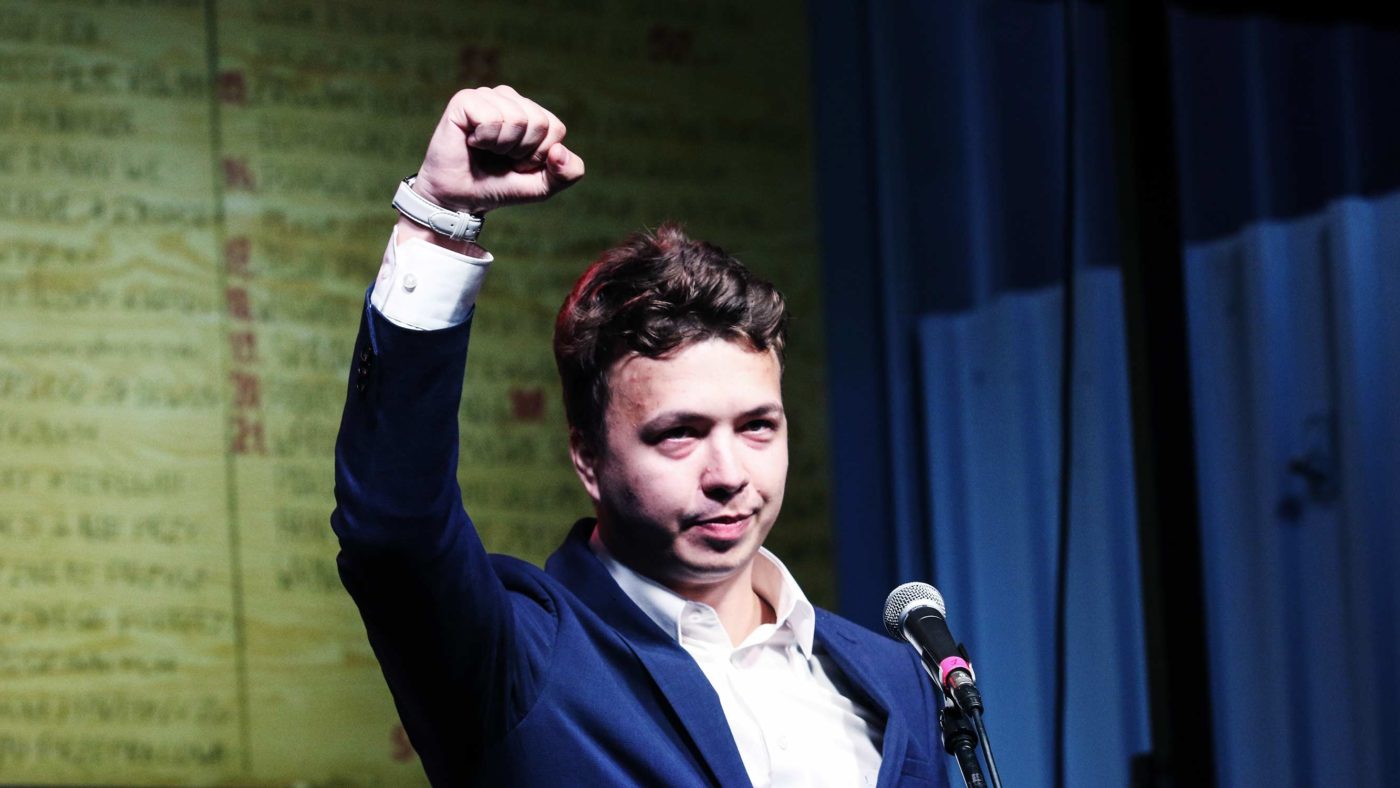The free world is losing the battle against dictatorships, and democratic countries must act decisively in response to Belarus’s interception of a Ryanair plane to arrest a journalist if international law is to have any meaning.
To recap recent events, yesterday Belarusian authorities ordered the flight from Athens to Vilnius to land in Minsk, claiming there was a report of a bomb on board, and scrambling a fighter jet to escort the plane. The real reason for the diversion was to arrest NEXTA Telegram channel founder Roman Protasevich, 26, who fled Belarus in 2019, and his girlfriend, 23-year-old Russian student Sofia Sapega. Protasevich has been named as a wanted “terrorist” by the Lukashenko government for publicising unauthorised protests. When the plane landed he told fellow passengers that he could face the death penalty.
Ryanair CEO Michael O’Leary described the situation with characteristic bluntness: “This was a case of state-sponsored hijacking… state-sponsored piracy,” he told Ireland’s Newstalk. “It appears the intent of the authorities was to remove a journalist and his travelling companion… we believe there were some KGB agents offloaded at the airport as well.” (In keeping with the Soviet stylings of Lukashenko’s regime, the Belarusian security service is still called the KGB).
There’s a distinct possibility that Russia was either involved in the operation or at the very least gave it their blessing. Exiled Belarusian opposition leader Pavel Latushko said six people did not re-board the plane in Minsk, including four Russian citizens. This has yet to be confirmed, but it could indicate Moscow’s direct involvement in the incident. Latushko also claimed the Ryanair pilots were told the plane would be shot down if it did not land in Minsk. Another so far unexplained detail is that Lithuanian police have said 126 people boarded the plane in Athens but only 121 arrived in Vilnius.
Whether the Kremlin was directly involved or not, Russia’s state media and officials were certainly enthusiastic about the stunt. RT’s editor-in-chief, Margarita Simonyan, tweeted that “Batka” (Lukashenko’s nickname) had “performed beautifully”. Vyacheslav Lysakov, an MP for the ruling United Russia party, praised a “brilliant special operation”, and Sergei Goncharov, a veteran of the Alpha group special forces, commented: “This is the first time I’ve seen such a combination in the history of the security services.”
This isn’t the first time the Belarusian KGB has gone after its opponents abroad. It is also suspected of involvement in the car bombing murder of Belarusian journalist Pavel Sheremet in Kyiv in 2016, for which Ukraine has not succeeded in convicting anyone. Several regime opponents in Belarus have been killed since mass protests erupted last August after Lukashenko claimed victory in the presidential election, but their deaths have not made as many headlines as the Ryanair incident.
And the repression shows no sign of abating. Just a few days ago, on May 21, the death of 50-year-old activist Vitold Ashurak was announced. He was serving a five-year prison sentence for participating in the protests. In the same week the offices of independent news outlet TUT.by in Minsk were raided by police, its website was blocked and several journalists were arrested. The latest news from Minsk is that a Lufthansa plane at the airport destined for Frankfurt has been evacuated with authorities announcing another “terrorist threat”. Lukashenko is doubling down.
What should the West do in response?
Both the EU and the UK have already imposed numerous financial sanctions on Belarusian officials, but there is now growing pressure to do more. Former Polish Foreign Minister Radek Sikorski told the BBC that Belarus’s state airline Belavia should be banned from European airspace and Lukashenko should go on trial at the International Criminal Court. The chairs of several countries’ parliamentary foreign affairs committees, including the UK’s Tom Tugendhat, published an open letter calling for sanctions on Belarus and a ban on all overflights, including flights to and from the country. “Tyranny has no place in Belarus or in Europe. It threatens not only its own citizens but millions of others around the world,” they said.
Another creative proposal came from former Estonian President Toomas Hendrik Ilves, who suggested that the International Ice Hockey Federation should expel Belarus from the World Championships in Riga. “This will hurt the hockey-loving dictator Lukashenka more than anything, showing the immediate effect of state terrorism,” Ilves tweeted.
At a summit today the EU will have to hastily come up with a plan that could make a real difference to the suffering people of Belarus. Fine words are not enough – indeed, routine expressions of deep concern are now a ridiculed meme on social media. As for the UK, it too must also follow through on promises to coordinate with allies and demonstrate that it has a robust post-Brexit sanctions policy.
The proposed Belavia ban and the removal of Belarus from all international sporting events, including the Olympics, would be a start. Other countries should also follow the example of Lithuania and provide all possible assistance to Belarusian journalists and activists who have been forced out of the country. For now, no one in Europe can feel safe from the KGB.
Click here to subscribe to our daily briefing – the best pieces from CapX and across the web.
CapX depends on the generosity of its readers. If you value what we do, please consider making a donation.


